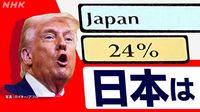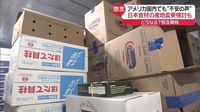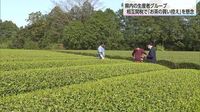The Trump administration in the United States has initiated a second round of 'reciprocal tariffs' aimed at countries with large trade deficits, including Japan, effective April 9, 2025, at 1:01 PM Japan time. This new measure imposes a 24% tariff on Japanese goods, adding to the 25% additional tariff already levied on automobiles the previous week. The combined effects of these tariffs are expected to reverberate through a wide array of domestic industries.
According to experts and private think tanks, these tariffs could potentially reduce Japan's GDP by between 0.3% and 0.8%. Some analysts have even likened the anticipated economic shock to the severity of the past Lehman Brothers crisis or the impact of the COVID-19 pandemic.
In New York, the repercussions of these tariffs are already being felt in local businesses. A bar owner specializing in Japanese sake expressed concern about the rising costs of imported products. "Reducing the variety of sake we offer would disappoint our customers, so we might have to find new ways to keep prices affordable until the situation improves," the owner stated.
Customers at the bar voiced their worries, indicating that the price hikes might change their dining habits. One customer remarked, "I come here to drink, but I might start cooking dinner at home instead." Another echoed this sentiment, predicting a decline in visits to the bar due to increased costs.
In the realm of meat exports, Hiroaki Yasuda of Wagyu Master USA revealed that they are lowering their profit margins to keep wagyu beef accessible to customers amid the tariff pressures. "We have to do whatever we can to ensure our customers can still afford to buy our products," Yasuda explained.
Similarly, Nobuaki Yamari, president of Yama Seafood, indicated that while there is a strong desire to promote more Japanese seafood, they must adapt to customer needs. "We want to sell more Japanese products, but if we can't meet customer demand, forcing them won't make sense," he said. Yamari is considering changing sourcing locations based on customer feedback.
The broader implications of these tariffs extend to various sectors. For instance, an aircraft parts manufacturer that was set to export products this month decided to postpone shipments after their American customer could not guarantee coverage for the increased tariffs. This decision reflects a cautious approach in light of ongoing trade negotiations between Japan and the United States.
In the agricultural sector, the impact on Hida beef exports is noteworthy. JA Hida Meat, the sole processor of Hida beef for export, has seen its exports grow since being certified for overseas sales in 2010. In fiscal year 2024, exports to the United States accounted for approximately 14% of their total volume, amounting to 6.2 tons. The new tariffs raise concerns about the future of these exports.
On the political front, Liberal Democratic Party (LDP) official Koichi Ono visited a SUBARU factory in Ota City, Gunma Prefecture, on April 9, where he discussed the implications of the new tariffs with company executives. "About 70% of SUBARU vehicles are either exported to the United States or produced locally there, so they are significantly affected by these tariffs," Ono noted. He emphasized the need for the party to formulate necessary policies to address these challenges.
During his visit, Ono also engaged with local business owners who supply parts to the automotive industry, gathering insights on how to maintain production amid these tariff-induced pressures. He later shared with reporters that there is a palpable sense of anxiety spreading across manufacturing sectors in Japan, prompting a call from Chief Cabinet Secretary Hirokazu Hayashi for the party to quickly compile its views on the situation.
The implementation of these tariffs not only raises concerns about immediate economic impacts but also poses longer-term challenges for Japan's trade relationships. As industries brace for the repercussions, the government and businesses alike are left to navigate a complex landscape marked by uncertainty.
In summary, the recent imposition of reciprocal tariffs by the Trump administration is reshaping the economic landscape for Japanese exports and local businesses. From sake bars in New York to meat processors in Gifu, the effects of these tariffs are being felt far and wide, prompting a reevaluation of strategies to cope with rising costs and shifting consumer behavior. As the situation develops, both government officials and business leaders will need to remain vigilant in addressing the challenges posed by these tariffs.






